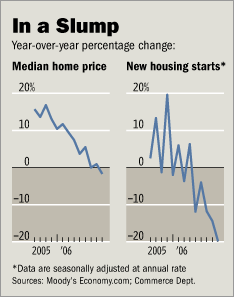_[Been a little light on Matrix this week because I released on 3Q 06 market report. Back on track next week.]_
_Jonathan_

Fed Chair Bernanke gave a speech yesterday in Washington which was widely covered in the media and discussed in the article [Housing Hurts, Bernanke Says [WaPo]](http://www.washingtonpost.com/wp-dyn/content/article/2006/10/04/AR2006100400901.html):
>As you know, a substantial correction is going on in the housing market,” Bernanke said, using stronger language than he had in recent months, when he described the real estate cool-down as “orderly.” The process is one of the “major drags causing the economy to slow,” he said.
The housing market weakened throughout the summer halving GDP from the first to the third quarters this year. He was unable to speculate how much weaker the housing market will get but that weaker housing hasn’t damaged the economy but will shave about a percent off of GDP from where it would have been, as discussed in the the article [Bernanke Expects Housing Slide To Rein In Second-Half Growth [WSJ]](http://online.wsj.com/article/SB115996969091382367-search.html?KEYWORDS=housing&COLLECTION=wsjie/6month).
>…the housing sector is undergoing a “substantial correction” that will likely shave about “a percentage point off growth in the second half of the year” from what it would otherwise have been “and probably something going into next year as well,”
Weaker economic conditions have been responsible for lower mortgage rates to date and the Fed chair sees further economic weakening into 2007.

Whats been surprising has been the continued strength of consumer spending. Business was supposed to take over the consumers drive of the consumption based economy, but that hasn’t fully been realized. [Consumers got religion this summer to keep spending [BW]](http://www.businessweek.com/bwdaily/dnflash/content/oct2006/db20061002_236497.htm?chan=top+news_top+news+index_businessweek+exclusives) despite less equity in their homes or greater costs associated with tapping it.
[The consumer theory was this: [WSJ]](http://online.wsj.com/article/SB115975425967779644.html?mod=googlenews_wsj).>So far, however, only half of that equation is panning out: Americans aren’t using their houses like ATMs as much as they once did. Even so, their willingness to spend hasn’t suffered, though economists don’t agree on why.
The theory is that average incomes are way up this year, about 8%, gasoline prices dropped, mortgage rates dropped, corporate profits are up and exports increased.
Another explanation is that the role of home equity and its importance was simply exagerated.
That makes more sense to me, in fact “housing” and “exageration” seem to go hand in hand.
2 Comments
Comments are closed.


Thanks for posting this. I am seeing articles on line that indicate that new agents had it easy and will be the first to leave when things goet tough. This business has never been easy. New agents had fierce competition because there are so many of us. Some of the experienced agents are the ones the coasted through the boom years and they may have trouble. They were so busy they did not take the time to learn knew skills. They will wake up and realize that if they can’t use a computer they may be in for a rough ride.
Only my opinion: a decrease in consumption will lag behind reduced HEW by at least a few months. Perfect example is the horde of NYU students milling around outside my apartment building whose education is financed by such HEW. Parents aren’t going to suddenly pull those students out of school en masse, ask for their money back and enroll them in a nice, cheap local state/city college.
That money has already been yanked out of the house and placed in some sort of trust to be paid to NYU. That student will continue using that HEW cash to finish their degree and consume quite conspicuously for the remainder of their stay*.
The HEW withdrawn isn’t necessarily spent all at once. It continues to bolster consumption for what I suspect to be a few months after it begins to peter out. Good idea for a graph, perhaps? HEW vs. consumption. It might actually be a first, I don’t think we’ve seen an economic recovery so heavily dependent on one specific driver before.
*Good thing, too, I’m about to place an ad for my old 32″ TV in one of their dorms.